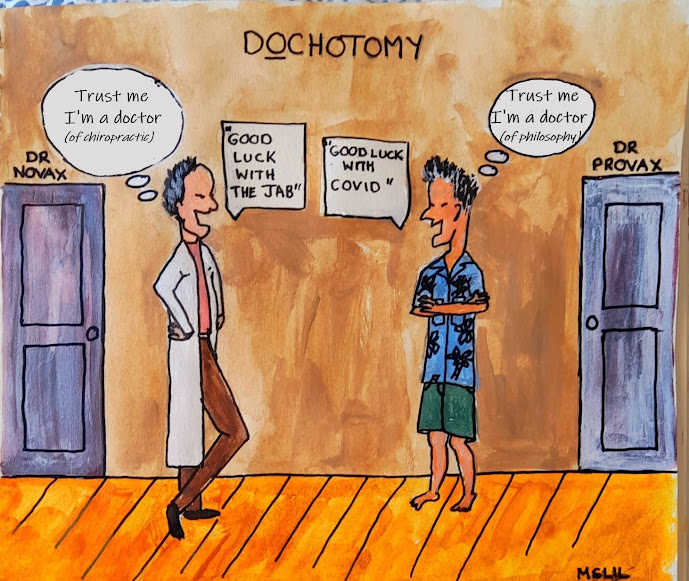Sitting around with a group of people discussing the challenges of communication in relationships when one person offered an insight that I really liked:
"You can be right or you can be happy."
Can't you be both?
One person suggested: "If I'm right, then I am happy."
"Ah, but if you think you are right, reason surely tells you that you may be mistaken. Right ? So your happiness is not assured."
Turns out that Voltaire has wrestled with this question in a thought-story which is produced in its entirety below.
---------------------------------------------------------------------------------------------------
Story of a Good Brahmin / Histoire d'un Bon Bramin
Voltaire / Francois
trans. H.I. Woolf, https://www.k-state.edu/english/baker/english320/Voltaire-Story_of_a_Good_Brahmin.htm
Version originale
https://lettres.ac-versailles.fr/spip.php?article154
On my travels I met an old Brahmin, a
very wise man, of marked intellect and great learning. Furthermore, he was
rich and consequently, all the wiser, because, lacking nothing, he needed to
deceive nobody. His household was very well managed by three handsome
women who set themselves out to please him. When he was not amusing
himself with his women, he passed the time in philosophizing.
Near his
house, which was beautifully decorated and had charming gardens attached, there
lived a narrow-minded old Indian woman: she was a simpleton, and rather
poor.
Said the Brahmin to me one day:
"I wish I had never been born!" On my asking why, he
answered: "I have been studying forty years, and that is forty years
wasted. I teach others and myself [I] am ignorant of everything. Such a
state of affairs fills my soul with so much humiliation and disgust that my life
is intolerable. I was born in Time, I live in Time, and yet I do not know
what Time is. I am at a point between two eternities, as our wise men say,
and I have no conception of eternity. I am composed of matter: I
think, but I have never been able to learn what produces my thought. I do
not know whether or not my understanding is a simple faculty inside me, such as
those of walking and digesting, and whether or not I think with my head as I grip
with my hands. Not only is the cause of my thought unknown to me:
the cause of my actions is equally a mystery. I do not know why I exist,
and yet every day people ask me questions on all these points. I have to
reply, and as I have nothing really worth saying I talk a great deal, and am
ashamed of myself afterward for having talked."
"It is worse still when I am
asked if Brahma was born of Vishnu or if they are both eternal. God is my
witness that I have not the remotest idea, and my ignorance shows itself in my
replies. "Ah, Holy One," people say to me, "tell us why
evil pervades the earth." I am in as great a difficulty as those who
ask me this question. Sometimes I tell them that everything is as well as
can be, but those who have been ruined and broken in the wars do not believe a
word of it -- and no more do I. I retire to my home stricken at my
own curiosity and ignorance. I read our ancient books, and they double my
darkness. I talk to my companions: some answer me that we must enjoy
life and make game of mankind; others think they know a lot and lose themselves
in a maze of wild ideas. Everything increases my anguish. I am ready
sometimes to despair when I think that after all my seeking I do not know whence
I came, whither I go, what I am nor what I shall become."
The same day I saw the old woman who
lived near him. I asked her if she had ever been troubled by the thought
that she was ignorant of the nature of her soul. She did not even
understand my question. Never in all her life had she reflected for one
single moment on one single point of all those which tormented the
Brahmin. She believed with all her heart in the metamorphoses of Vishnu
and, provided she could obtain a little Ganges water wherewith to wash herself,
thought herself the happiest of women.
Struck with this mean creature's
happiness, I returned to my wretched philosopher. "Are you not
ashamed," said I, "to be unhappy when at your very door there lives an
old automaton who thinks about nothing, and yet lives contentedly?"
"You are right," he
replied. "I have told myself a hundred times that I should be happy
if I were as brainless as my neighbor, and yet I do not desire such
happiness."
My Brahmin's answer impressed me more
than all the rest. I set to examining myself, and I saw that in truth I
would not care to be happy at the price of being a simpleton.
I put the matter before some
philosophers, and they were of my opinion. "Nevertheless," said
I, "there is a tremendous contradiction in this mode of thought, for, after
all, the problem is -- how to be happy? What does it matter whether
one has brains or not? Further, those who are contented with their lot are
certain of their contentment, whereas those who reason are not certain that they
reason correctly. It is quite clear, therefore," I continued,
"that we must choose not to have common sense, however little common sense
may contribute to our discomfort." Everyone agreed with me, but I
found nobody, notwithstanding, who was willing to accept the bargain of becoming
a simpleton in order to become contented. From which I conclude that if we
consider the question of happiness we must consider still more the question of
reason.
But on reflection it seems that to
prefer reason to [happiness] is to be very senseless. How can this
contradiction be explained? Like all the other contradictions. It is
a matter for much talk.
------------------------------------------------------------------------------------------------------
It is indeed a matter for much talk.
It seems unlikely that reason can lead us to happiness.
But happiness is elusive as Douglas Adams explored in The Hitchhiker's Guide to the Galaxy:
“I'd far rather be happy than right any day."
"And are you?"
"No. That's where it all falls down, of course."
"Pity", said Arthur. "It sounded like rather a good lifestyle otherwise.”
― Douglas Adams, The Hitchhiker’s Guide to the Galaxy
So, happiness is blind to reason. And maybe I should be too?
That is, happiness is a good lifestyle -- the trick is to find it.
Reason can't tell me how to find happiness, but reason will tell me when I have found it.
And if I have happiness, I can still reason -- within reason: I may be right, I may be wrong. In effect, reason will leave me uncertain -- as it always does. But I will know if I am happy.
Maybe it is this that underlies the curious (and for me, confounding) statement from the famously contented philosopher David Hume:
"Reason is, and always ought to be, the slave of the passions."
And maybe it is this that underlies Albert Camus' views expressed as a 19 year old:
"You will never be happy if you continue to search for what happiness consists of. You will never live if you are looking for the meaning of life."
So maybe the solution is: lead with happiness, let reason follow - or not.
------------------------------------------------------------------------------------------------------
OTHER LINKS
https://www.dailyabsurdist.com/blog/2019/1/16/wise-fools
https://www.linkedin.com/pulse/reason-passion-secret-happy-life-harriet-green
https://www.huffpost.com/entry/do-you-want-to-be-happy-or-right_b_57d9bdd5e4b053b1ccf28e19
















